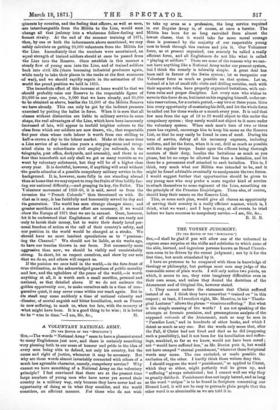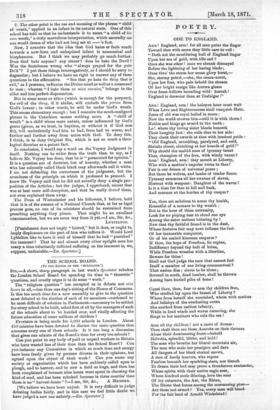THE VOYSEY JUDGMENT.
[TO THE EDITOR OF THE " SPECTATOR21
shall be glad if you will allow one of the unlearned to express some surprise at the shifts and subtleties to which some of the able, learned, and ingenious persons known as Broad Church- men seem to be driven by the recent judgment ; not by it for the first time, but much stimulated by it.
I have no pretence to be compared with them in knowledge of theology or philosophy, but perhaps most men may judge of the reasonable sense of plain words. I will only notice two points, on which, it seems to me, they raise imaginary difficulties even in their own sense, and unless they denied the doctrines of the Atonement and of Original Sin, however stated.
1. They cannot endure the statement that Christ suffered instead of us. I think they have somewhat "trained on " in this respect ; at least, if I recollect right, Mr. Maurice, in his " Theolo- gical Lectures" allows the phrase "vicarious suffering." But what is the simple meaning of the words ? I am not speaking of the attempts at forensic precision, and presumptuous analysis of the supposed rationale of the Atonement, such as may be seen in "Paradise Lost," and in hundreds of other books, and which I detest as much as any one. But the words only mean that, after the Fall, if Christ had not lived and died as he did (supposing such a possibility), had it not been for his humiliation and suffer- ings, mankind, so far as we know, would not have been saved ; not "would have suffered less," as Mr. Davies puts it, but would not have escaped "eternal punishment," whatever those Scriptural words may mean. The one excluded, or made possible the exclusion of, the other. I hardly think those writers deny this.
I should suppose the word "punishment," as applied to Christ, which they so abhor, might perfectly well be given up, and " suffering " always substituted ; but I cannot well see why they so greatly dislike it. Punishment does not imply hatred, and as long as the word " stripes " is to be found in Scripture concerning our Blessed Lord, it will not be easy to persuade plain people that the other word is so abominable as we are told it is. 2. The other point is the use and meaning of the phrase "child' of wrath," applied to an infant in its natural state. One of this school has told us that he understands it to mean "a child of his own wrath," a truly marvellous interpretation, which assuredly no one would dream of who had not long sat at —'s feet.
Now, I conceive that the idea that God hates or feels wrath towards a new-born and unbaptized infant is nonsensical and blasphemous. But I think we may probably go much further. Does God hate anyone? any sinner ? does he hate the Devil ? Was the Scotchman wrong who "always prayed for the pair Dell"? I put these things interrogatively, as I should be sorry to dogmatize ; but I believe we have no right to answer any of these questions in the affirmative. "See that ye hate the thing that is evil," as I presume, indicates the Divine mind as well as a command to men ; whereas "I hate them as mine enemies," belongs to the elder and less perfect dispensation.
But in some sense or other (which is enough for the purpose), the evil of the thing, if it abides, will exclude the person from God's favour ; in other words, he will be under God's wrath. This seems elementary enough ; but I conceive the much-maligned phrase in the Catechism means nothing more. A "child of wrath" is a child whose mere nature, unless influenced by God's grace (given, as we trust, in baptism, or without it if God sees fit), will undoubtedly lead him to bad, from bad to worse, and further and further away from union with God. To deny this, I think, is to deny Original Sin, which is not so much a theo- logical doctrine as a patent fact.
In conclusion, I would say a word on the Voysey Judgment in itself. Nothing can be wider from the truth than to say, as I believe Mr. Voysey has done, that he is "persecuted for opinion." It is a question not of doctrine, but of honesty, whether a man who has solemnly called black black may afterwards call it white. I am not defending the correctness of the judgment, but the soundness of the principle on which it professed to proceed. I know Mr. Voysey said that he did not actually deny a single pro- position of the Articles ; but the judges, I apprehend, meant that was at best mere self-deception, and that he really denied them, not even explained them away.
The Dean of Westminster and his followers, I believe, hold that it is of the essence of a National Church that, as far as legal process goes, no one of its ministers should be restrained from preaching anything they please. That might be an excellent consummation, but we are some way from it yet.—I am, Sir, &c.,
LYTTELTO.N.
[Punishment does not imply "hatred," but it does, or ought to, imply displeasure on the part of him who inflicts it. Would Lord Lyttelton like to have it said of himself that he had "punished" the innocent? That he and almost every other upright man has many a time reluctantly inflicted suffering on the innocent is, we, suppose, undeniable.—ED. Spectator.]



































 Previous page
Previous page